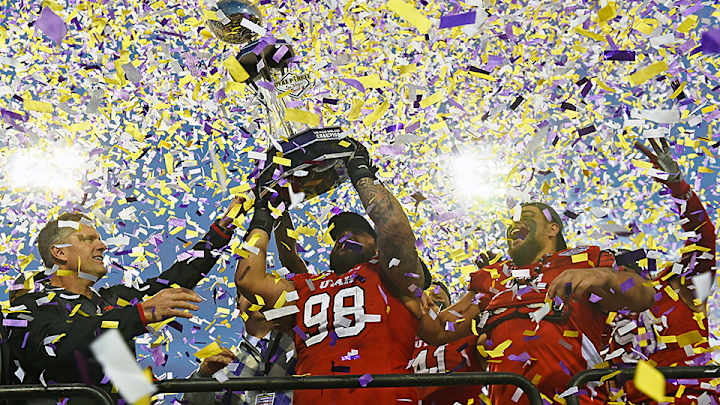Utah's 'Holy War' win over BYU the silver lining to disappointing season

The storied history between Utah and BYU goes back nearly a century. The two programs shared a conference from 1922 to 2010 and played every year between 1946 and 2013. The series affectionately known as the “Holy War” took a hiatus during the last two seasons, but on Saturday in the Las Vegas Bowl, the heated rivalry renewed.
Utah, however, brought more heat to Sin City. The Utes built an early double-digit lead and staved off a late Cougars rally to win the Holy War 35–28 in the Las Vegas Bowl.
Year in review: Top 10 moments of 2015; 10 bold predictions for 2016
BYU made things a lot easier for Utah with a dismal first quarter on offense. The Cougars looked little like the team that’d only committed 15 turnovers all season, coughing up the ball five times in the first 15 minutes. With 4:38 left in the first quarter, Utah led 35–0. The Utes’ defense notched two pick-sixes and almost recorded a third when Tevin Carter returned a Tanner Mangum interception to the BYU 1. Running back Joe Williams turned that miscue into a touchdown on the next play.
Those turnovers skewed a first half in which Utah couldn’t do much on offense. It had just 76 yards of offense at the break compared to BYU’s 190, and the Utes averaged just 2.8 yards per play through two quarters. But Utah’s stingy defense, which finished the season ranked sixth nationally in turnovers gained (29), did the dirty work. That led to a 35-7 advantage at halftime.
The Cougars, meanwhile, failed to show much energy until the second half, but they eventually turned on the jets. They staged an inspired comeback to cut the lead to 35-27 with 3:23 to play. But Utah and quarterback Travis Wilson answered by controlling the clock on its final drive.
QB transfers raise serious questions about Sumlin’s viability at Texas A&M
Bowl games are often determined by motivation, with the decided edge going to the team that wants it more. Utah seemed more likely to sleepwalk into Las Vegas after coveting higher aspirations earlier this season. Coach Kyle Whittingham led his team to a 6–0 start and a No. 3 ranking in the AP poll with wins over Michigan and Pac-12 foes Arizona State, Cal and Oregon. At one point the Utes were the only undefeated team left in the Pac-12.
But Utah quickly tumbled from playoff contention. After dropping a 42-24 loss at then-unranked USC on Oct. 24, the program finished the regular season with a 3–3 record. Just like that, Utah’s shot at a national championship had disappeared.
Fortunately for Whittingham, his players proved they could still show up for the Holy War. BYU’s sluggish start might’ve been defined by emotion, however. It entered the rivalry game facing an uncertain future for the first time in more than a decade. The game would be head coach Bronco Mendenhall’s last as BYU head coach before he left to take over at Virginia. (Prior to kickoff, SI.com’s Thayer Evans reported thatOregon State defensive coordinator Kalani Sitake would be named the next coach at BYU.) Perhaps the Cougars wanted to win too much for the departing Mendenhall.
Coaching uncertainty could have easily plagued Utah at this point in the season, as well. During Utah’s undefeated start, Whittingham’s name surfaced in connection with many other jobs, including USC. But it feels like the Utes’ headman, who has been with the program in some capacity since 1994, will stick around Salt Lake City a little longer. That’s good news for all Utah fans.
McElwain has Florida poised to move on after Will Grier's transfer
With a win over BYU, the Utes notched their first 10-win season as Pac-12 members and the first since 2010, when they played in the Mountain West. Many Utah fans still might point to 2015 as a disappointment, a reminder instead of what could’ve been. After all, the program was a power in the Mountain West, notching three 10-win seasons and beating Alabama in the Sugar Bowl in 2008 to cap a 13–0 season. But the Pac-12 was a different animal; As recently as two seasons ago, the Utes were coming off consecutive five-win campaigns in their new league. The experiment seemingly wasn’t paying off for Whittingham’s program.
Two years later, Utah sees itself as a team that should contend for national championships. That’s a testament to what Whittingham has built. Next year this squad is set to return 13 starters, including seven from a defense that stifled most of the Pac-12 this year. That’s why the ride isn’t over for the Utes’ program just yet. And even though Utah didn’t reach new heights in 2015, a rousing victory over rival BYU—and a win over Mendenhall in his last Holy War—served as a fitting silver lining to the season.
